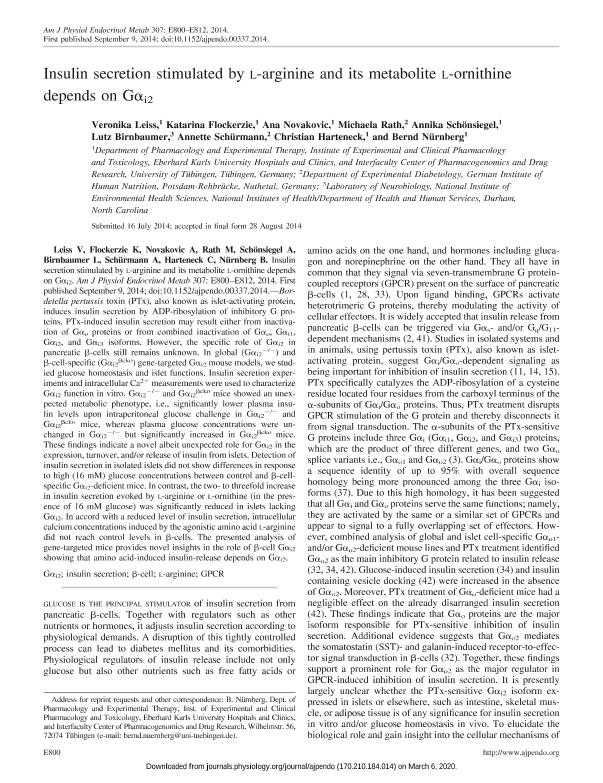Artículo
Insulin secretion stimulated by L-arginine and its metabolite L-ornithine depends on Gα(i2)
Leiss, Veronika; Flockerzie, Katarina; Novakovic, Ana; Rath, Michaela; Schönsiegel, Annika; Birnbaumer, Lutz ; Schürmann, Annette; Harteneck, Christian; Nürnberg, Bernd
; Schürmann, Annette; Harteneck, Christian; Nürnberg, Bernd
 ; Schürmann, Annette; Harteneck, Christian; Nürnberg, Bernd
; Schürmann, Annette; Harteneck, Christian; Nürnberg, Bernd
Fecha de publicación:
01/11/2014
Editorial:
American Physiological Society
Revista:
American Journal of Physiology - Endocrinology and Metabolism
ISSN:
0193-1849
Idioma:
Inglés
Tipo de recurso:
Artículo publicado
Clasificación temática:
Resumen
Bordetella pertussis toxin (PTx), also known as islet-activating protein, induces insulin secretion by ADP-ribosylation of inhibitory G proteins. PTx-induced insulin secretion may result either from inactivation of Gα(o) proteins or from combined inactivation of Gα(o), Gα(i1), Gα(i2), and Gα(i3) isoforms. However, the specific role of Gα(i2) in pancreatic β-cells still remains unknown. In global (Gα(i2)(-/-)) and β-cell-specific (Gα(i2)(βcko)) gene-targeted Gα(i2) mouse models, we studied glucose homeostasis and islet functions. Insulin secretion experiments and intracellular Ca²⁺ measurements were used to characterize Gα(i2) function in vitro. Gα(i2)(-/-) and Gα(i2)(βcko) mice showed an unexpected metabolic phenotype, i.e., significantly lower plasma insulin levels upon intraperitoneal glucose challenge in Gα(i2)(-/-) and Gα(i2)(βcko) mice, whereas plasma glucose concentrations were unchanged in Gα(i2)(-/-) but significantly increased in Gα(i2)(βcko) mice. These findings indicate a novel albeit unexpected role for Gα(i2) in the expression, turnover, and/or release of insulin from islets. Detection of insulin secretion in isolated islets did not show differences in response to high (16 mM) glucose concentrations between control and β-cell-specific Gα(i2)-deficient mice. In contrast, the two- to threefold increase in insulin secretion evoked by L-arginine or L-ornithine (in the presence of 16 mM glucose) was significantly reduced in islets lacking Gα(i2). In accord with a reduced level of insulin secretion, intracellular calcium concentrations induced by the agonistic amino acid L-arginine did not reach control levels in β-cells. The presented analysis of gene-targeted mice provides novel insights in the role of β-cell Gα(i2) showing that amino acid-induced insulin-release depends on Gα(i2).
Palabras clave:
PROTEINA G(i2)
,
INSULIN DOSING
,
GPCR
Archivos asociados
Licencia
Identificadores
Colecciones
Articulos(IIB-INTECH)
Articulos de INST.DE INVEST.BIOTECNOLOGICAS - INSTITUTO TECNOLOGICO CHASCOMUS
Articulos de INST.DE INVEST.BIOTECNOLOGICAS - INSTITUTO TECNOLOGICO CHASCOMUS
Citación
Leiss, Veronika; Flockerzie, Katarina; Novakovic, Ana; Rath, Michaela; Schönsiegel, Annika; et al.; Insulin secretion stimulated by L-arginine and its metabolite L-ornithine depends on Gα(i2); American Physiological Society; American Journal of Physiology - Endocrinology and Metabolism; 307; 1-11-2014; E800–E812
Compartir
Altmétricas



